Daily Vocabulary Words: List of Daily Used Words in Leading Indian Newspapers
Hi there. Welcome to this special section @ Wordpandit. Our endeavour here is straightforward: highlighting daily vocabulary words that you would come across in leading newspapers in the country. We have included the following newspapers in our selection:
• The Times of India
• The Economic Times
• Hindustan Times
• Mint
• Indian Express
We are putting in extensive work to develop your vocabulary. All you have to do is be regular with this section and check out this post daily. This is your repository of commonly used words; essentially, we are posting a list of daily used words. Hence, this has significant practical application as it teaches you words that are commonly used in leading publications mentioned above.
Visit the website daily to learn words from leading Indian newspapers.
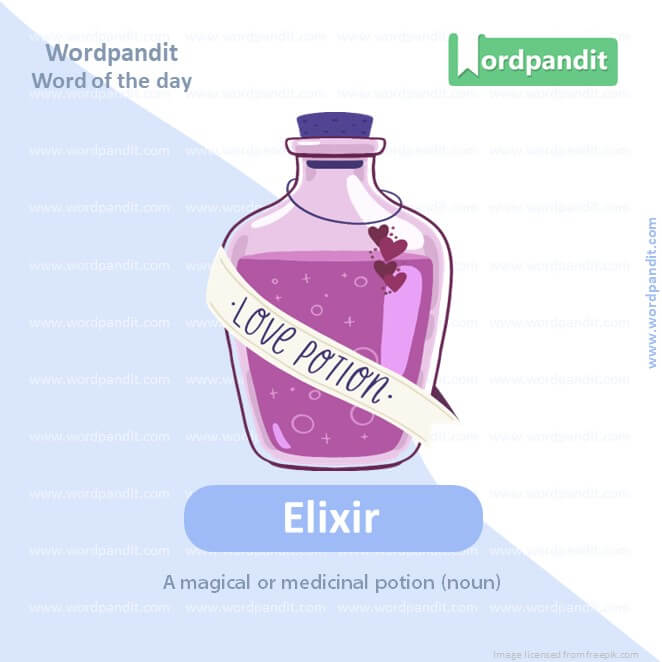
WORD-1: Elixir
CONTEXT: This judgment will only prolong the long and arduous struggle to create the conditions where same-sex couples could live a life without fear, in the sweet elixir of freedom, and the imprimatur of equal recognition.
SOURCE: Indian Express
EXPLANATORY PARAGRAPH: Imagine a magical drink that can make someone feel better or give them special powers. That special kind of drink is called an “elixir.”
MEANING: A magical or medicinal potion (noun).
PRONUNCIATION: “ehLIKsir”
SYNONYMS: Potion, remedy, panacea, tonic, cure-all, brew, concoction.
USAGE EXAMPLES:
1. The old tale spoke of an elixir that granted eternal youth.
2. The herbalist made an elixir to help with sleep.
3. He believed the elixir would cure his cold.
4. She searched for the legendary elixir in ancient texts.
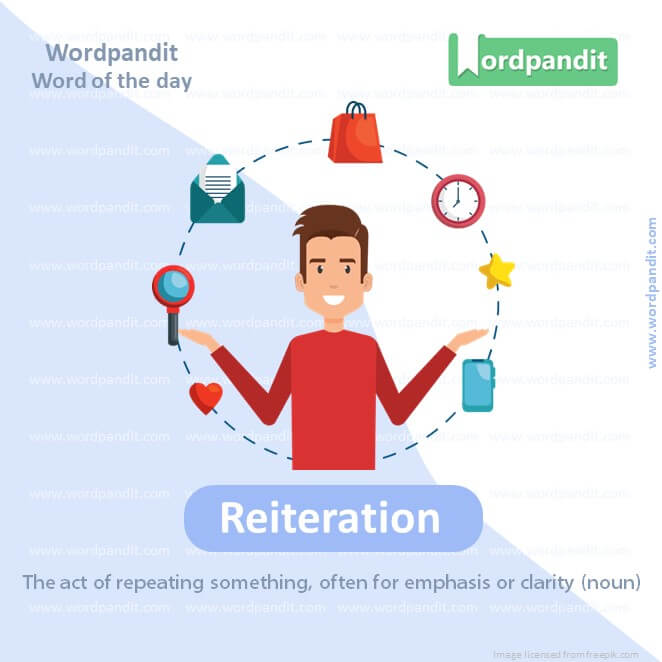
WORD-2: Reiteration
CONTEXT: The Chief Justice’s judgment begins with a profound reiteration of the values that protect the dignity of individuals: A regard for their autonomy, privacy, freedom to choose and their well-being.
SOURCE: Indian Express
EXPLANATORY PARAGRAPH: Imagine saying something again and again to make sure someone understands. That act of repeating is called “reiteration.”
MEANING: The act of repeating something, often for emphasis or clarity (noun).
PRONUNCIATION: “reeituhRAYshun”
SYNONYMS: Repetition, restatement, echo, recurrence, redundancy, replay, replication.
USAGE EXAMPLES:
1. The teacher’s reiteration of the rules ensured everyone understood.
2. Despite his reiteration, the message was not clear to all.
3. The reiteration of her point made it stick in my mind.
4. His constant reiteration was starting to annoy the audience.
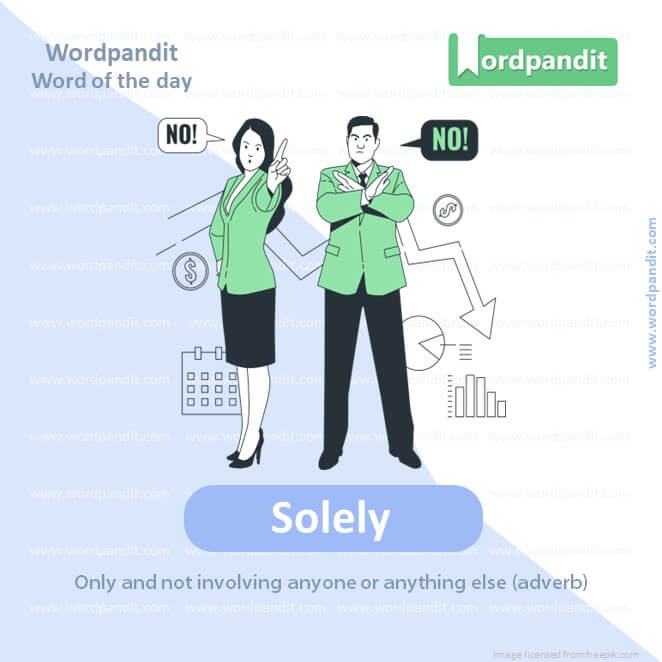
WORD-3: Solely
CONTEXT: The basic thread around which it constructs an argument is this: No one can be denied a human good that should be available to them solely on account of their sexual orientation.
SOURCE: Indian Express
EXPLANATORY PARAGRAPH: Imagine you have one toy and only that toy to play with, no others. When you have only one thing, or do something for only one reason, we say it’s done “solely.”
MEANING: Only and not involving anyone or anything else (adverb).
PRONUNCIATION: “SOHlee”
SYNONYMS: Exclusively, only, purely, entirely, just, merely, singularly.
USAGE EXAMPLES:
1. The decision was based solely on the evidence.
2. She came to the party solely to see her friend.
3. The room was designed solely for reading.
4. He relied solely on his intuition.
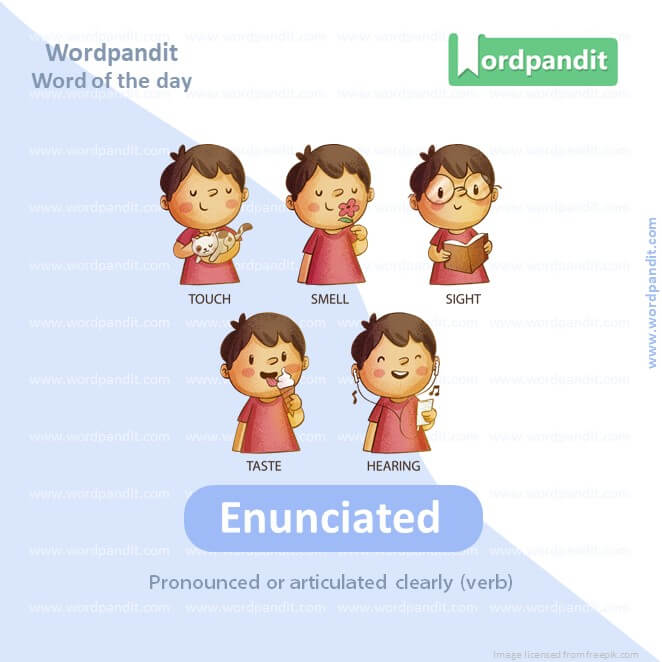
WORD-4: Enunciated
CONTEXT: So the CJI enunciated the principle of discrimination with one hand, only to limit its applicability to the real issue at stake.
SOURCE: Indian Express
EXPLANATORY PARAGRAPH: Imagine speaking very clearly, so every word is easy to understand. When you say words like that, you have “enunciated” them.
MEANING: Pronounced or articulated clearly (verb).
PRONUNCIATION: “eeNUNseeayted”
SYNONYMS: Pronounced, articulated, voiced, expressed, said, uttered, vocalized.
USAGE EXAMPLES:
1. The teacher enunciated each word so students could understand.
2. He enunciated his words when giving the important announcement.
3. During the play, the actor enunciated his lines perfectly.
4. It’s essential to enunciate when speaking to a large audience.
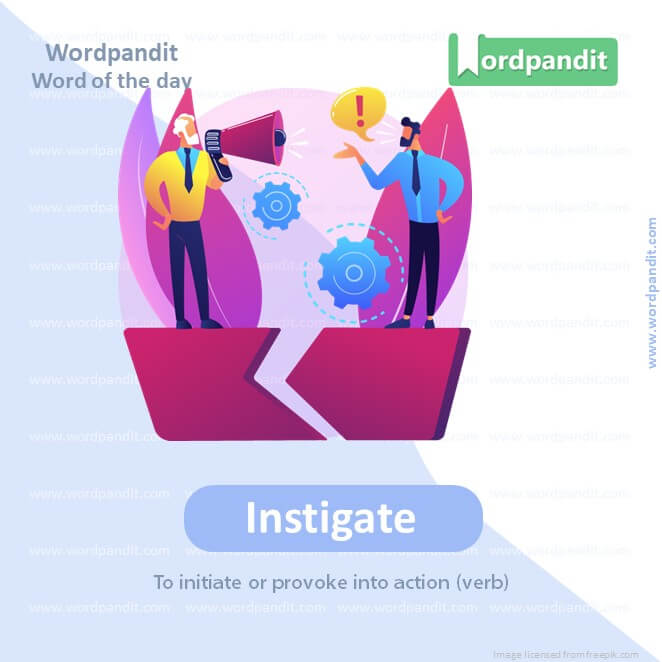
WORD-5: Instigate
CONTEXT: To what extent can courts instigate moral change, without incurring a backlash? As Justice Sanjay Kishan Kaul said rightly, constitutional morality cannot be shaped by social morality: That argument would equally apply to parenting practices that the Court seeks to modify, as it would to the institution of marriage.
SOURCE: Indian Express
EXPLANATORY PARAGRAPH: Think of someone who starts a snowball fight by throwing the first snowball. When someone starts something, especially if it’s a bit naughty or causes trouble, they “instigate” it.
MEANING: To initiate or provoke into action (verb).
PRONUNCIATION: “INstigayt”
SYNONYMS: Provoke, incite, stir up, spark, trigger, encourage, prompt.
USAGE EXAMPLES:
1. He didn’t want to fight, but his friend instigated it.
2. Who instigated this mischief?
3. The rumor was instigated by an unknown source.
4. She often instigated debates in the classroom.
WORD-6: Fugitive
CONTEXT: Again, this relegates same-sex union to a fugitive identity that cannot even be clearly named, let alone fully recognized.
SOURCE: Indian Express
EXPLANATORY PARAGRAPH: Imagine someone who is running away and hiding because they did something wrong, and they don’t want to be caught. That person on the run is called a “fugitive.”
MEANING: A person who has escaped and is hiding to avoid being caught (noun).
PRONUNCIATION: “FYOOjihtiv”
SYNONYMS: Runaway, escapee, deserter, refugee, outlaw, absconder, evader.
USAGE EXAMPLES:
1. The police are searching for the fugitive.
2. He became a fugitive after escaping from jail.
3. The town was on high alert with a fugitive on the loose.
4. The fugitive was last seen crossing the border.
WORD-7: Abysmal
CONTEXT: Congress party’s abysmal record on rights of marginalized.
SOURCE: Indian Express
EXPLANATORY PARAGRAPH: Imagine looking into a hole that’s so deep, you can’t see the bottom. When something is really, really bad or deep like that, we say it’s “abysmal.”
MEANING: Extremely bad or of a very low standard (adjective).
PRONUNCIATION: “uhBIZmuhl”
SYNONYMS: Terrible, dreadful, awful, horrible, atrocious, appalling, deplorable.
USAGE EXAMPLES:
1. The movie received abysmal reviews from critics.
2. The team’s performance was abysmal.
3. The conditions of the camp were abysmal.
4. His understanding of the topic was abysmal.
WORD-8: Harmonize
CONTEXT: So, your aim should be to harmonize the inner mind and outer expressions.
SOURCE: Times of India
EXPLANATORY PARAGRAPH: Imagine singers singing different notes, but they sound beautiful together. When things go well together or match in a pleasing way, they “harmonize.”
MEANING: To make or become harmonious; to match or be congruent with (verb).
PRONUNCIATION: “HARmuhnize”
SYNONYMS: Coordinate, match, blend, balance, synchronize, integrate, tune.
USAGE EXAMPLES:
1. The colors in the room harmonize well.
2. The singers tried to harmonize their voices.
3. We need to harmonize our efforts for better results.
4. The decorations harmonize with the theme of the event.
WORD-9: Overwhelming
CONTEXT: Hamas terrorist attacks in Israel were a classic example of how terrorist groups use asymmetric warfare against a more militarily powerful state actor – and push the state to respond with overwhelming force.
SOURCE: Times of India
EXPLANATORY PARAGRAPH: Imagine a big wave of water coming over you, and it’s so big you can’t stand up. When something is too much or really, really strong, we say it’s “overwhelming.”
MEANING: Very intense or great in amount (adjective).
PRONUNCIATION: “ohverWHELming”
SYNONYMS: Overpowering, immense, intense, staggering, profound, unbearable, crushing.
USAGE EXAMPLES:
1. The support from everyone was overwhelming.
2. She felt an overwhelming sense of gratitude.
3. The team faced overwhelming odds.
4. There’s an overwhelming
WORD-10: Prosthetic
CONTEXT: The applications have been across a wide spectrum, including improvements in the Jaipur foot, a prosthetic artificial limb.
SOURCE: Times of India
EXPLANATORY PARAGRAPH: Imagine someone has a toy robot arm. Now, some people might have a special arm or leg that’s not real, but it helps them move or do things just like a real one. This special helper part is called a “prosthetic.”
MEANING: An artificial body part (noun).
PRONUNCIATION: “prosTHEHtik”
SYNONYMS: Artificial limb, implant, replacement, substitute, augmentation, extension, attachment.
USAGE EXAMPLES:
1. After the accident, he received a prosthetic leg.
2. The prosthetic arm allowed her to play the piano again.
3. Advances in technology have improved prosthetic designs.
4. The athlete competed with a prosthetic blade.
Vocabulary Daily Use
In the fascinating world of language learning, we often concentrate on taking giant leaps, but the real magic lies in the small steps of ‘vocabulary daily use’. These frequently used words and phrases form the backbone of practical communication and understanding. Therefore, mastering ‘vocabulary daily use’ is a crucial element in achieving language fluency.
To effectively learn ‘vocabulary daily use’, one needs to venture beyond the traditional textbook resources. The real essence of these words unveils itself in everyday exposure and interactions. Engaging with a variety of material like novels, magazines, newspapers, podcasts, films and digital content deepens the understanding of ‘vocabulary daily use’. Immersion in these contexts yield natural, everyday language that bridges the gap between the classroom and the real world.
The journey of mastering ‘vocabulary daily use’ necessitates the integration of innovative memory techniques. Flashcards and the Leitner System aid in embedding these words into your long-term memory by promoting active recall. Additionally, the use of mnemonic devices, which allow you to associate ‘vocabulary daily use’ with personal and familiar narratives, can enhance your ability to remember and recall these words.
Moreover, it’s important to remember that ‘vocabulary daily use’ isn’t just about comprehension- it’s about practice and active usage. Incorporate these words in your day-to-day communication and social interactions. This not only solidifies your understanding but also accelerates learning and internalization of ‘vocabulary daily use’.
In a nutshell, mastering ‘vocabulary daily use’ is a continual process that demands exposure, creative learning strategies and assertive practice. The commingling of these tactics brews the perfect formula that allows learners to seamlessly integrate ‘vocabulary daily use’ into their linguistic repertoire. And with that, they can navigate the nuances of language with confidence and ease.













